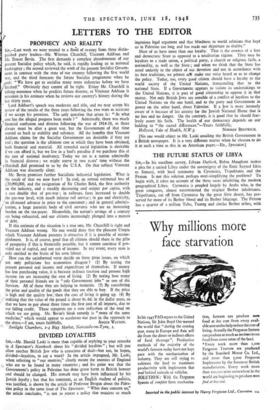LETTERS TO
THE EDITOR
PROPHECY AND REALITY
Sm,—Last week we were treated to a flocid of oratory from three distin- guished party leaders—Mr. Winston Churchill, Viscount Addison and Mr. Ernest Bevin. The first demands a complete abandonment of our present Socialist policy which, he said, is rapidly leading us to national bankruptcy ; the second reviewed the work of the present Socialist Govern- ment in contrast with the state of our country following the first world war, and the third forecasts the future Socialist programme when he said: "We have got to socialise many more industries before we have Nfinished." Obviously they cannot all be right. Either Mr. Churchill is talking nonsense when he predicts future disaster, or Viscount Addison is mistaken in his estimate when he reviews our country's history during the last thirty years.
• Lord Addison's speech was moderate and able, and we may accept his review of the results of the three years following the two wars as accurate if we accept his premises. The only question that arises is : " At what cost has the alleged progress been made ? " Admittedly, there was much 1 financial confusion and distress following the war of 1914-18, as there always must be after a great war, but the Government of that time steered us back to stability and solvency. All the benefits that Viscount Addison claims for the Socialist Government are desirable if they are real ; the question is the ultimate cost at which they have been obtained, both financial and material. All remedial social legislation is desirable if we can afford it, but we live in a fool's paradise if we purchase this at the cost of national insolvency. Today we are as a' nation admittedly in financial distress ; we might starve in two ycars' time without the t Marshall Aid promised to us by the U.S.A. On that subject Viscount
Addison was discreetly silent. .
Mr. Bevin promises further Socialistic industrial legislation. What is the result of that we now have ? In coal, an annual estimated loss of L20,000,000, and the resignation of Sir Charles Rdd, the first authority on the industry, and a steadily decreasing coal output per capita, with a cost double that of pre-war ; in railways, fares increased to double the pre-war level, with much inferior rail service ; in gas and electricity, an all-round advance in price to the consumer ; and in general adminis- tration, a large parasitic body of civil servants who are an increasing burden on the tax-payer. Meanwhile, the nation's savings of a century are being exhausted, and our citizens increasingly plunged into a morass of debt.
If this estimate of the situation is a true one, Mr. Churchill is right and Viscount Addison wrong. No one would deny that the pleasant Utopia which Viscount Addison presents is attractive if it is possible of accom- plishment. It is, of course, good that all citizens should share in the gifts of prosperity if this is financially possible, but it cannot continue if pro- vided out of capital, and not out of income. In any' event, every man is only entitled to the fruits of his own labour.
How can the uninformed voter decide on these great issues, on which ( not only politicians but economists disagree ? (1) By testing the present personal real income and expenditure of themselves. If money has less purchasing value, it is because indirect taxation and present high income tax are increasing the cost of living. (2) By noting how many of their personal friends are in " safe Government jobs " or one of the Services. All of these they are helping to maintain. (3) By considering the price and quality of the goods that they are able to buy. If the price is high and the quality low,'then the cost of living is going up. (4) By realising that the value of the pound is about 6s. 6d. in the dollar areas, so that we have to pay about three times the first cost of all imports, due to our falling credit. These signposts are a sure indication of the road on which we are going. Mr. Bevin's bleak remedy is " more of the same medicine," which would appear to accelerate our pace in the approach to


































 Previous page
Previous page